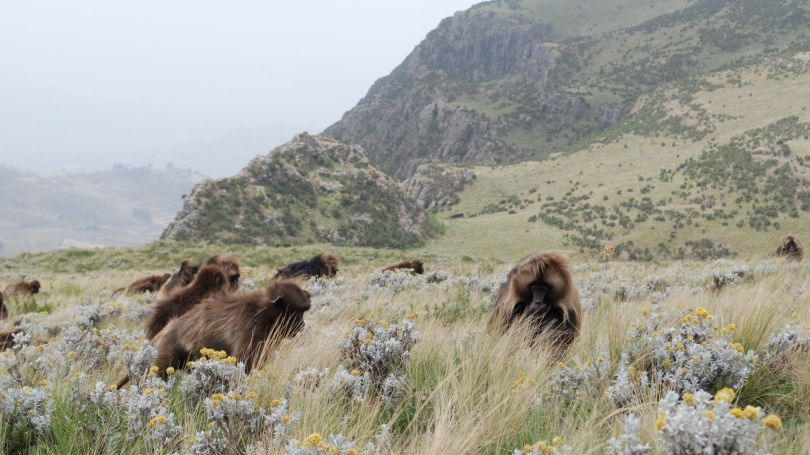
- About
- Undergraduate
- Graduate
- Foreign Study
- Research
- News & Events
- People
Back to Top Nav
Back to Top Nav
Back to Top Nav
Back to Top Nav
Back to Top Nav
The paper published in the ISME Journal (International Society for Microbial Ecology) on July 12, 2018, stems from work by two ex-Dartmouth students, Jill Britton ’14 and Katie Amato ’07, and Charles Hansen Professor of Anthropology Nathaniel J. Dominy. Some of the data in this paper was supported by the Goodman fund, when an undergrad grant was awarded to Jill Britton in 2011.
"Evolutionary trends in host physiology outweigh dietary niche in structuring primate gut microbiomes"
Katherine R. Amato 1 ● Jon G. Sanders 2,5 ● Se Jin Song 2,5 ● Michael Nute3 ● Jessica L. Metcalf4 ● Luke R. Thompson2,5 ● James T. Morton2,5,21 ● Amnon Amir2,5 ● Valerie J. McKenzie6 ● Gregory Humphrey2,5 ● Grant Gogul7 ● James Gaffney7 ● Andrea L. Baden8 ● Gillian A.O. Britton9 ● Frank P. Cuozzo10 ● Anthony Di Fiore11 ● Nathaniel J. Dominy 9 ● Tony L. Goldberg12 ● Andres Gomez13 ● Martin M. Kowalewski14 ● Rebecca J. Lewis11 ● Andres Link15 ● Michelle L. Sauther16 ● Stacey Tecot17 ● Bryan A. White18 ● Karen E. Nelson19 ● Rebecca M. Stumpf20 ● Rob Knight 2,5,21 ● Steven R. Leigh16
Received: 23 August 2017 / Revised: 18 January 2018 / Accepted: 27 March 2018
© International Society for Microbial Ecology 2018
Abstract
Over the past decade several studies have reported that the gut microbiomes of mammals with similar dietary niches exhibit similar compositional and functional traits. However, these studies rely heavily on samples from captive individuals and often confound host phylogeny, gut morphology, and diet. To more explicitly test the influence of host dietary niche on the mammalian gut microbiome we use 16S rRNA gene amplicon sequencing and shotgun metagenomics to compare the gut microbiota of 18 species of wild non-human primates classified as either folivores or closely related non-folivores, evenly distributed throughout the primate order and representing a range of gut morphological specializations. While folivory results in some convergent microbial traits, collectively we show that the influence of host phylogeny on both gut microbial composition and function is much stronger than that of host dietary niche. This pattern does not result from differences in host geographic location or actual dietary intake at the time of sampling, but instead appears to result from of differences in host physiology. These findings indicate that mammalian gut microbiome plasticity in response to dietary shifts over both the lifespan of an individual host and the evolutionary history of a given host species is constrained by host physiological evolution. Therefore, the gut microbiome cannot be considered separately from host physiology when describing host nutritional strategies and the emergence of host dietary niches.